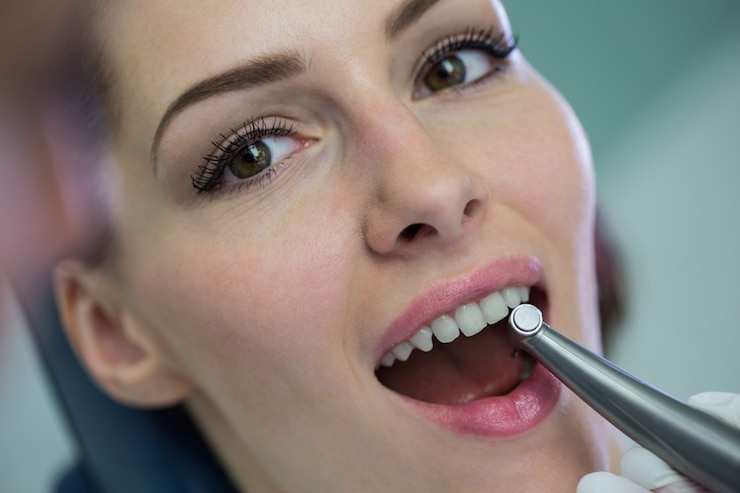Teething is a common and natural process that everyone goes through during childhood. As permanent teeth come in, many parents notice their child’s gums becoming swollen or inflamed. But why does this happen? Is it a cause for concern, or is it just a regular part of dental development? In this guide, we’ll delve into the reasons behind gum swelling during tooth eruption, how to manage the discomfort, and when to seek professional dental care.
Why Do Gums Swell When Permanent Teeth Come In?
The eruption of permanent teeth typically begins around the age of six. As the new teeth push through the gums, they can cause irritation and inflammation in the surrounding tissue. This natural process is the body’s response to the pressure exerted by the new teeth coming in, which can lead to localised swelling and discomfort.
The swelling occurs because the gum tissue stretches to accommodate the emerging tooth. Increased blood flow to the area can also contribute to the swelling, as the gums become more sensitive and inflamed. While gum irritation during teething is common, it is usually not a cause for concern unless the swelling is severe or persists for an extended period.
What Are the Symptoms of Gum Swelling During Permanent Teeth Eruption?
The symptoms associated with gum swelling during the eruption of permanent teeth are fairly standard. Parents should be aware of the following:
- Tender or swollen gums: The area around the erupting tooth may appear red or swollen.
- Mild bleeding: Gums may bleed slightly when touched or while brushing.
- Pain or discomfort: Children may experience mild pain, particularly when eating or touching the affected area.
- Increased drooling: Drooling is common during the teething process due to the irritation in the mouth.
- Fussiness or irritability: The discomfort may cause children to be more irritable or upset than usual.
- Slight fever: Some children may experience a low-grade fever as their permanent teeth come in.
How Long Does Gum Swelling Last?
The duration of gum swelling can vary from child to child. Typically, it lasts a few days to a week as the tooth emerges. However, the exact timeline can depend on several factors, including the type of tooth coming in and how quickly the tooth erupts.
How to Soothe Swollen Gums During Permanent Teeth Eruption
While gum swelling is usually mild and resolves on its own, there are several ways to soothe your child’s discomfort during this process. Here are some tried and tested methods to ease the symptoms:
- Cold Compresses or Chilled Teething Rings: Cold helps to reduce swelling and numb the discomfort. Offering your child a chilled teething ring or applying a cold compress to the gums can provide relief.
- Gentle Massage: Using a clean finger, gently massage the swollen gums to relieve pressure and soothe the irritation.
- Pain Relief: Over-the-counter pain relievers such as acetaminophen or ibuprofen can be given, but only under the guidance of a healthcare professional.
- Soft Foods: Offering softer foods during this time can reduce irritation. Avoid hard or crunchy foods that may exacerbate gum swelling.
When to See a Dentist
While gum swelling is generally a harmless part of the teething process, there are instances when it’s important to consult with a dentist near you. If any of the following symptoms occur, it’s time to schedule a dental appointment:
- Severe or persistent pain: If your child experiences severe pain that doesn’t subside with basic care, a dentist should assess the situation.
- Excessive bleeding: Mild bleeding can occur, but excessive bleeding or bleeding that does not stop should be evaluated by a professional.
- Infection signs: If the swollen gums are accompanied by pus, redness, or a fever, this could be a sign of an infection that requires immediate attention.
- Delayed tooth eruption: If the teeth don’t emerge by the expected age or if they are delayed, it may be necessary to have the child checked for potential underlying issues.
Typical Age Range for Permanent Teeth to Erupt
| Tooth Type | Average Eruption Age | Common Issues Associated with Eruption |
| Central Incisors | 6-7 years | Mild gum swelling, discomfort |
| Lateral Incisors | 7-8 years | Gum tenderness, mild redness |
| First Molars | 6-7 years | Swollen gums, sensitivity |
| Canines | 9-11 years | Inflammation, difficulty chewing |
| Second Molars | 11-13 years | Gum irritation, slight bleeding |
What Are the Most Common Causes of Gum Swelling During Tooth Eruption?
There are several reasons why gums may swell during the eruption of permanent teeth. Understanding these causes can help parents manage their child’s discomfort:
- Pressure from the Tooth Coming In
- As the permanent tooth erupts, it pushes through the gum tissue, causing localised pressure. This pressure can lead to inflammation and swelling in the surrounding area.
- Increased Blood Flow
- The eruption process stimulates increased blood circulation to the gums, which can result in the gums becoming more sensitive and swollen.
- Infection or Poor Oral Hygiene
- While rare, an infection in the gums due to bacteria entering the area during eruption can also cause swelling. Poor oral hygiene can increase the risk of gum infections during this time.
Common Causes of Gum Swelling During Tooth Eruption
| Cause | Description |
| Pressure from the tooth coming in | The tooth pushing through the gum tissue can cause localised swelling and pain. |
| Increased blood flow | As the tooth erupts, there is more blood circulation in the gum tissue, leading to swelling. |
| Inflammation of the gum tissue | The eruption process irritates the gums, leading to inflammation and discomfort. |
| Infection or poor oral hygiene | If bacteria enter the gum area during eruption, it can lead to infection and further swelling. |
How to Ensure Good Gum Health During Tooth Eruption
Maintaining good oral hygiene is crucial for ensuring that the gums remain healthy during the eruption of permanent teeth. Here are some tips to support your child’s gum health during this time:
- Brush Regularly: Make sure your child brushes their teeth at least twice a day using a soft-bristled toothbrush and fluoride toothpaste.
- Use a Mouthwash: If your child is old enough, using a fluoride mouthwash can help to reduce the risk of plaque buildup around the erupting teeth.
- Regular Dental Checkups: Schedule routine visits to the dentist to monitor the eruption process and address any potential issues early on.
M&M Dental Care: Helping Your Child Through the Eruption of Permanent Teeth
At M&M Dental Care, we understand that the eruption of permanent teeth can be an uncomfortable experience for both children and their parents. Our experienced team is dedicated to providing the highest level of care during these important dental milestones. If your child is experiencing discomfort or if you’re concerned about the eruption process, don’t hesitate to reach out to us. We are here to support you through every step of your child’s dental development and ensure that their transition to permanent teeth is as smooth and pain-free as possible.
Read More: Do Gums Swell After Tooth Extraction? What to Expect
References
FAQs
- Why do my child’s gums swell when their permanent teeth are coming in?
- Gums swell due to the pressure exerted by the erupting teeth as they push through the gum tissue. This pressure, along with increased blood flow, causes localised inflammation and discomfort.
- How long will my child’s gums stay swollen when permanent teeth come in?
- Swelling typically lasts for a few days to a week. However, it may vary depending on the specific tooth and the speed at which it erupts.
- Is gum swelling during tooth eruption normal?
- Yes, mild gum swelling is a normal part of the tooth eruption process. It is usually temporary and resolves once the tooth has fully emerged.
- How can I ease my child’s gum pain during tooth eruption?
- Cold compresses, teething rings, gentle gum massages, and over-the-counter pain relief (under a healthcare professional’s advice) can help soothe swollen gums.
- When should I see a dentist for swollen gums during teething?
- If the swelling persists for more than a week, is accompanied by excessive bleeding, or if your child shows signs of infection (fever or pus), consult a dentist.
- Can poor oral hygiene cause gum swelling during tooth eruption?
- Yes, poor oral hygiene can increase the risk of gum infections during teething. Keeping the mouth clean can help prevent infection and minimise swelling.





